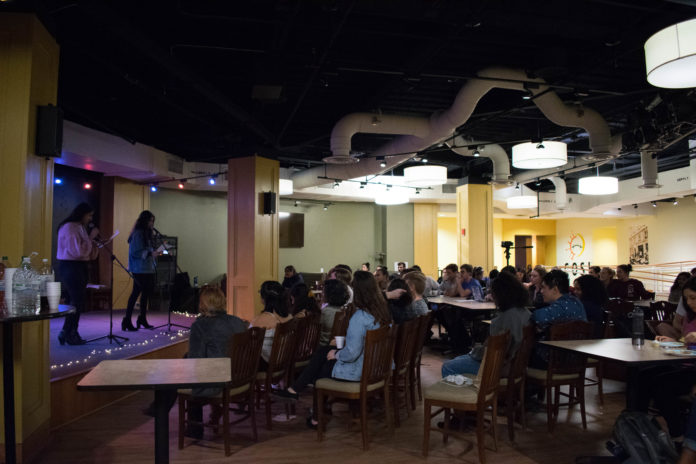Thursday, Feb. 22, the College of William and Mary’s Muslim Student Association put on its annual Muslim Voices show in Lodge 1. The event was hosted by Fatima Chaudry ’19 and Zauhirah Tipu ’19 and featured short skits between student presentations.
The presentations varied from poetry to spoken-word storytelling and discussed dispelling stereotypes, embracing identity and personal dialogues of what it means to be a Muslim in America.
“Yeah, honestly this should be called Muslims complain,” Chaudry said, joking about the show to come.
MSA Religious Activities Chair Akbar Naqvi ’18 spoke first. Naqvi performed two poems written by Denzel Dykes ’18, the first of which questioned narratives on suppressed identity, with repeating lines of “Who told you?” The second poem questioned the apparent otherness of minorities in American society, specifically regarding immigrants and refugees.
“Why does alien suggest bad character?” Naqvi said.
Addressing the sexual taboo in society and within Islam, Yahia Yaziji ’18 mentioned his own mother’s continuous refusal to discuss sex with him, forcing him to learn about it on his own.
Yaziji ended by saying that talking about sex more would pave the way for healthier interactions between genders and allow for healthier relationships.
“That sounds good, right? So whatever it is, let’s talk about sex,” Yaziji said.
Ramsha Saad ’20, who spoke about sexism in society and specifically against Muslim women, concurred with fellow performers that, contrary to narratives shown in the American media, being both a Muslim and a woman can be empowering.
“There are far too many people who think that a Muslim woman is a victim, that she’s helpless,” Saad said.
“There are far too many people who think that a Muslim woman is a victim, that she’s helpless,” Saad said.
Other students countered generalizations of what it means to be Muslim in America. Mariha Junaid ’21 expanded upon the nuances of living in America as a Muslim woman, feeling that she is forced to represent a huge population of people.
“I felt like I had the burden of an entire population of the world on my shoulders,” Junaid said.
Junaid, who said her first name means “the one that brings happiness” in Arabic and in Hebrew, said she felt pressure to always smile and be happy for everybody she interacted with.
Junaid said that in high school she came to the realization that she should not feel the pressure of being the ambassador for all Muslim women on her shoulder.
“You should not paint a picture of a thousand colors with one brush stroke,” Junaid said.
An anonymous letter to the author’s sister, read aloud by Zauhirah, recounted the author’s lengthy journey that led to their conversion to Islam, originally stemming from taking Arabic studies courses and an interest in Middle Eastern culture.
Naqvi, who recited an Urdu poem, kept the poem in the original language to preserve the beauty of the poem. After Naqvi, Junaid also returned to the stage, reading an anonymous speech about the author’s journey to becoming a Muslim.
Annika Hackfeld ’19 talked about her path toward Islam. Raised in a deeply Christian household, she said her journey was tumultuous and difficult.
Still, Hackfeld feels it was one of the best decisions she could have made.
Shadin Ahmed ’19 made closing remarks as she discussed her identity as a black, Muslim woman.
“When the world seems at its lowest, Muslim women getting their hijab torn off their head, black women getting murdered in front of their children, women getting their humanity diminished via sexual assault, it feels like we’re the ones humanity wants to punish the most,” Ahmed said.
“When the world seems at its lowest, Muslim women getting their hijab torn off their head, black women getting murdered in front of their children, women getting their humanity diminished via sexual assault, it feels like we’re the ones humanity wants to punish the most,” Ahmed said. “At times like these, I find myself thinking about being a triple threat: black, Muslim, woman.”
Despite the challenges Ahmed has faced, she said she maintains pride in her identity.
“My identity is what roots me to the ones before me,” Ahmed said. “My identity will serve as the branch that connects me to my daughter, and my daughter’s daughter.”

